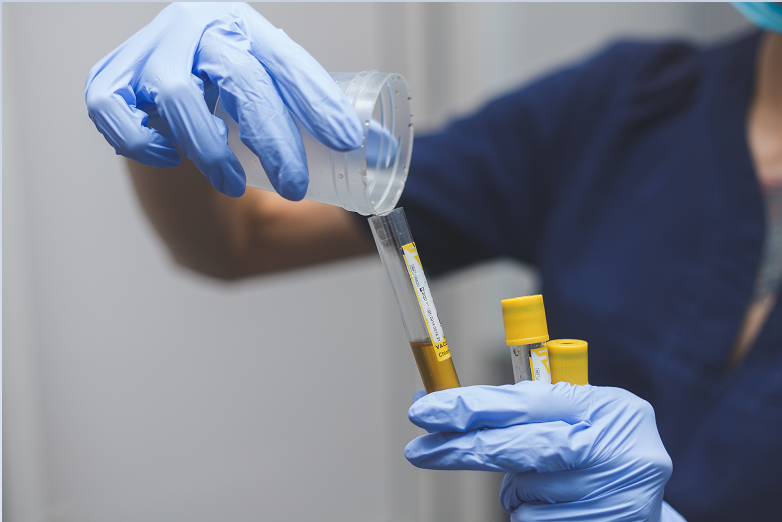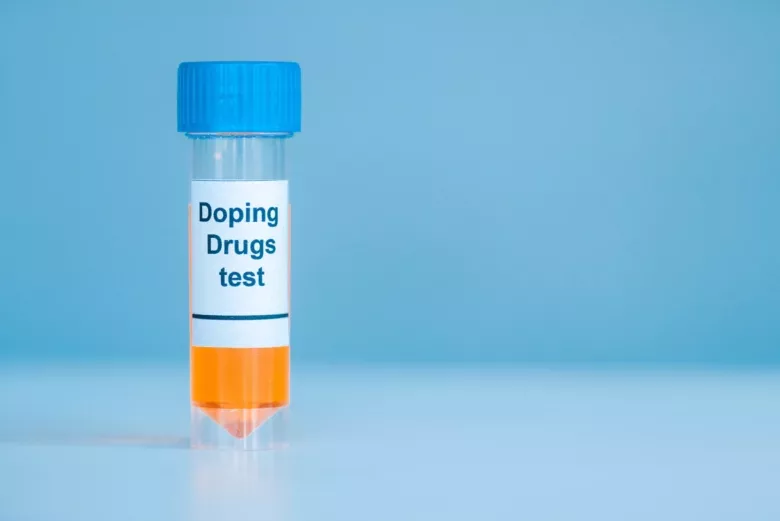A urine drug test is a non-invasive test that analyzes a person’s urine sample to check for the presence of drugs and foreign substances. It is commonly conducted for detecting drug classes like opiates, cannabis, and methamphetamines. It is also often performed for alcohol, nicotine, benzodiazepines, and other prohibited substances.
Who might request a urine test?
A urine drug test can be requested by:-
- Doctors: To test samples of any patient for medical reasons
- Forensic experts: To test samples collected as evidence
- Sports authorities: To test sportspersons before, after or during an event
- Government authorities (especially the military): To test samples of new recruits
- Employers: To test samples of their employees
- Any individual: For personal reasons
Purpose of a urine drug test
The purpose of a urine drug test is to detect the presence of drugs in the person body. It also helps determine if a patient is responding well to newly administered drugs before or after surgery. They are also conducted by companies who are hiring recruits or checking workplace code of conduct amongst existing and return-to-duty employees.
Urine drug tests are an important checkbox for the government when it comes to forensic investigations, military testing, or athletic tests. The test may shows signs of the drug or its biomarkers as found in the sample. Drugs, alcohol, and nicotine can be detected in the sample even days after consumption. To what extent each drug can be detected depends on its composition.
Which drugs can a urine drug test detect?
The urine drug screen is done for the following classes of drugs, depending upon the requirement of the concerned authority:-
x
- Opiates
- Cannabis (THC)
- Barbiturates
- Benzodiazepines
- Amphetamines
- Methamphetamines
- Cocaine
- Phencyclidine
- Alcohol
Detection window of substances in a UDT
| Drug | Detection window |
| Amphetamines | 1 to 3 days |
| Barbiturates:Short-termLong-term | 1 to 2 days2-3 weeks |
| Benzodiazepines | 3 to 7 days 4 to 6 weeks for extended dosage1 or more years for chronic use |
| Cocaine | 1 to 3 days |
| Methadone | 2 to 4 days |
| Opioids | 1 to 3 days |
| Phenicyclicine | 14 to 30 days |
| Propoxyphene | 6 to 48 hours |
How to prepare for a urine drug test?
- A urine collection container is given by the clinic to the individual.
- The person must empty their pockets and carry no external items.
- The genitalia must be cleaned to prevent contamination by external substances.
- The individual must not drink excessive amounts of water before the test.
- The individual must then urinate into the container (At least 45 ml).
- The temperature of the sample is checked.
- The container is closed and handed over for testing where it is sealed and packed.
Types of urine drug tests and how reliable they are
Urine tests are highly reliable if taken within the detection window. The reliability of urine tests depend on what kind of tests are being conducted on the urine sample. The three types of urine drug tests include:-
- Immunoassay (IA)
- Gas Chromatography-Mass Spectrometry(GC-MS)
- Liquid Chromatography-Mass Spectrometry (LC-MS/MS)
Immunoassay testing:-
Also known as the IA drug test, the immunoassay is more of a preliminary technique that does not always result in absolute accuracy. Although it is fast and cost-effective, it fails to detect certain opioids. This test is usually considered the first step in a UDT program. The reason why IA testing is more of a preliminary screening test than a definitive outcome is due to its possible misinterpretations. The test often results in false-positive or false-negative outcomes.
IA drug testing is used for detecting only the “Federal Five” drugs- Marijuana, Opiates, Cocaine, Phencyclidine (PCP), and Amphetamines. The GC-MS and the LC-MS/MS testing is done when there is a need to test the sample for other substances.
GC-MS testing:-
This is a comprehensive but, expensive screening test with a high rate of accuracy. It is done when the IA test comes back positive. There are rarely any false positives in the GC-MS method as mass spectrometry is a powerful detection technique that identifies even with traces of samples. GC-MS testing can also be used as the sole method for UDT.
GC-MS involves a gas chromatograph instrument into which the samples are injected. The sample is vaporized and carried along the length of a long capillary column with the help of a carrier gas. The components are separated based on factors like molecular weight or adsorption ability. They then pass into the mass spectrograph where they are ionized and the ionized fragments are detected to find their precursor compounds. There is a database in the computer which helps analyze the data and interpret results.
Liquid Chromatography-Mass Spectrometry (LC-MS/MS):-
This is a highly developed method of drug testing and is not used in common practice. Commercial drug testing services do not use the LC-MS/MS method as the GC-MS testing is quite reliable and self-conclusive. It is also cheaper than the LC-MS/MS technique and is mostly used for forensic purposes and in doping tests.
The principle of the liquid chromatograph is slightly different from the gas chromatograph. The sample, in its liquid phase, is passed through a column that is coated with an adsorbing material on the inside. The drugs and metabolites travel along with the liquid sample and are separated based on their adsorption to the column. It is then passed to the mass chromatograph where the same principle is followed as the GC-MS technique.
Factors affecting a urine drug test
Certain factors can affect the results of a urine drug test and result in false negatives or false positives.
- Dilution:-
Consumption of excessive amounts of water may not cause the suspected metabolites to disappear from the urine sample but may certainly cause them to dilute. This poses problems in quantitation. This drawback is not a major one because modern detection techniques have an extremely high level of sensitivity. Nonetheless, it is advised that the individual taking the test does not drink excess water before the test.
- Metabolism:-
Every individual has a different rate of metabolism and this can affect drug screening. It may not hide drugs in the sample but might change the quantity. Techniques like the immunoassay may detect levels of a drug and its metabolites in a combined manner, which may be well above the cut-off. However, confirmatory techniques like GC-MS and LC-MS/MS are able to identify drugs and their metabolites and individually qualify their levels, which can then be assessed for cutoff.
- Adulteration/Tampering:-
Since sample collection requires privacy for the donor, there can be possible chances of adulteration. The individual may dilute the sample with water and sometimes even adulterate it with substances like nitrates, which may minimize the chance of drugs being detected.
Can the urine sample be taken at home?
Although some laboratories and testing facilities allow you to collect your sample at home and bring them to the clinic for testing, most facilities do not allow this procedure for a UDT. Allowing individuals to pass their sample at home poses high chances of adulteration, exchange, and unprofessional methods.
While this can be allowed to some extent for personal test purposes, there is a strict protocol followed for urine drug testing for medical, occupational, and forensic purposes.
This means, if you are being tested by a government/private organization or a medical body, your sample will be collected by professionals.
Can you take a urine drug test at home?
At-home UDTs are available in the market for a range of drugs. There are both individual at-home tests and panel-drug tests available depending on whether you want to test one or multiple traces in a sample.
However, due to the lack of evidence and reliability of these tests, medical professionals advice against them. They are not a substitute for laboratory-based tests and their results must not be deemed conclusive.
Urine drug test results
The drug test result is the most important part of the process and can determine whether a sample is above or below the cutoff value. Some pointers you need to keep in mind before taking a urine test are as follows:-
- The immunoassay test results are expressed in nanograms per milliliter(ng/ml). This test does not measure the drug itself but rather detects the interaction of the drugs with the body’s immune system and their ability to form antigen-antibody complexes.
- This test uses a cutoff point. Any result below this point is negative while a result above this point is positive. This testing method is sometimes used in rapid detection kits and in those cases, the quantitative value is not displayed. The test kit turns to a particular color which generally interprets the result.
- In case the immunoassay method gives a positive result, the safe option is to take a GC-MS test. This test interprets the results on a different parameter. For the GC-MS technique, result interpretation is much simpler and more accurate. The results are generated by the computer system itself, both in the form of graphical and numerical data.
- The mass spectrometric instrument detects trace amounts of drugs and metabolites on the basis of their fragmentation and ionization ability. They are then detected by a photomultiplier tube which amplifies and detects the signal. It if further sent to the readout device or the computer where it is displayed on the screen as a graph along with the numerical values.
Cost of a urine drug test
In the United States, the cost of a urine drug test depends on whether the test is done at home or in a laboratory.
- For an at-home urine testing kit, the prices may vary from 10 USD to 50 USD. Some kits may be specific to one drug only while other kits may have the feature of testing for multiple drugs. Depending upon the manufacturer and the number of drugs it can detect, the cost of the kits varies within the mentioned price range.
- Laboratory rates for urine drug testing are slightly higher for laboratory testing facilities. The prices may range from 50 USD to 90 USD depending upon the number of drugs being tested and the laboratory where the testing is done. This is the most widely used test method as at-home tests are not reliable.
Choose Affordable Rapid Testing, Phoenix for urine drug testing services
Affordable Rapid Testing provides easy, reliable, and affordable urine drug testing services. Whether you are looking for bulk UDT or even personal drug testing services, you can schedule an online appointment or simply walk in to clear your doubts and get tested. They are DOT and DHHS certified Urine Specimen collectors. You can rely on their state-of-the-art infrastructure for the most accurate UDT results.


